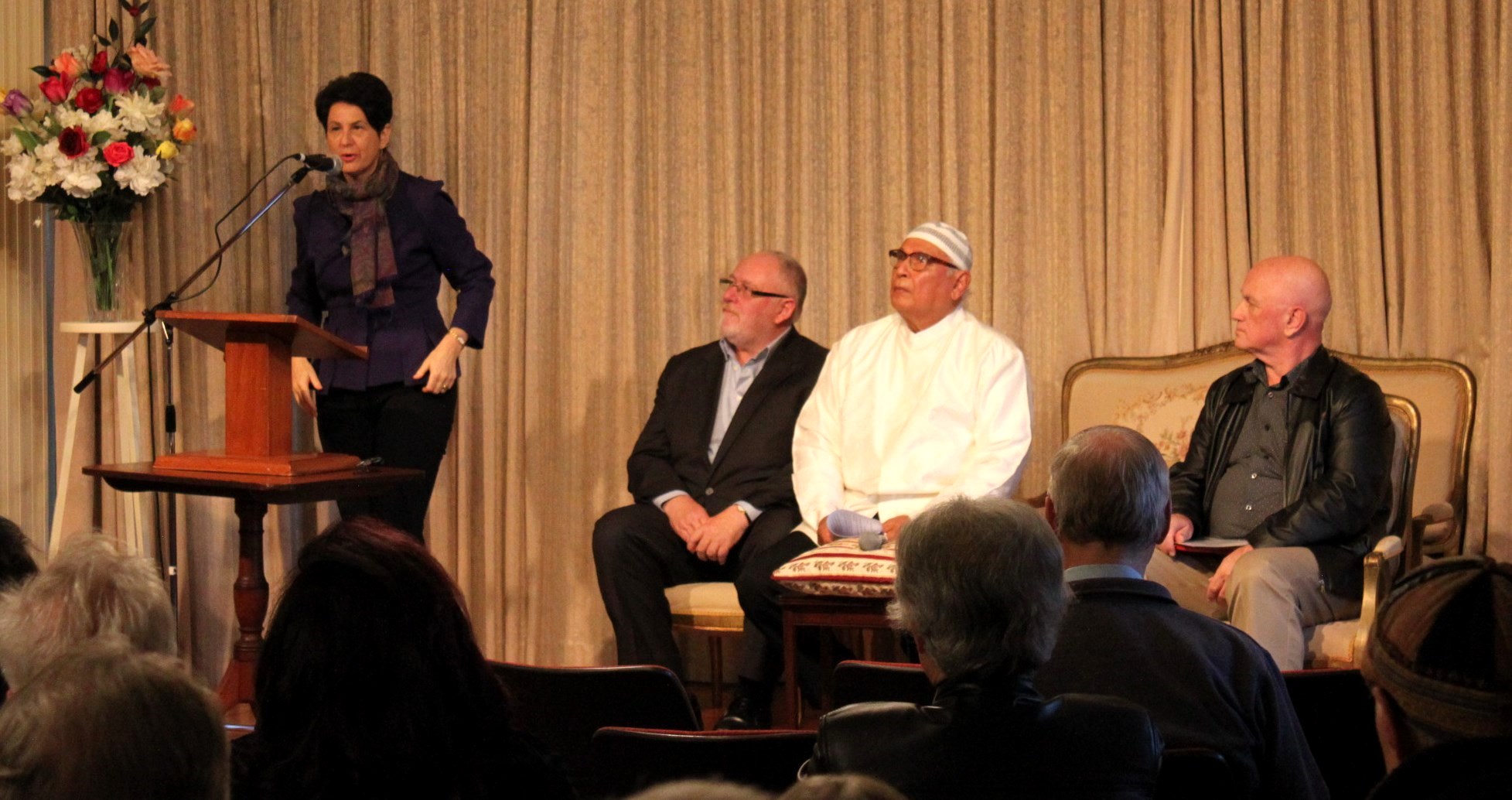Melbourne Interfaith Dialogue Considers Radicalism, Faith, and Moving Beyond Victimhood

L to R: Deborah Stone, Barney Zwartz, Nuim Khaiyath and Tony Floyd. Photo: Jamie Vu
“What is extremism in my religion, and how can it be countered?” This was the question posed to a panel of religious leaders and commentators who convened during the National Gathering at Armagh in Melbourne on the weekend of 11 June.
Co-organized by Initiatives of Change and Melbourne’s Indonesia Club, the event began with Indonesian angklung music, and closed with a traditional dance performance. In between, Barney Zwartz, former religion editor of The Age, moderated a discussion among people of the Christian, Jewish and Muslim faiths, touching on radicalism, faith and the need to move beyond victimhood.
“Muslims feel, rightly or wrongly, under siege,” said former Radio Australia journalist and lay preacher Nuim Khaiyath. Nuim, originally from Indonesia, quoted a series of verses from the Quran and the Hadith (the teachings of the Prophet), which demonstrate the teachings of tolerance. A true Muslim is never excessive, he said; unfortunately, world events have led some Muslims to respond in a way that misrepresents these teachings. He reflected that harsh responses against Islamic extremism only serve to increase feelings of insecurity in the community, where many abide by the traditional injunction, “Unto you, your religion. Unto me, my religion.”
Yet, is a radical faith necessarily a bad thing? Uniting Church minister Tony Floyd suggested that, for some Christians, radicalism can mean seeking to follow as closely as possible the example of Jesus, rather than the strictures of organized religion. He quoted US civil rights activist Martin Luther King who, writing from the prison cell where he was jailed as an extremist in 1963, challenged his readers, “Was not Jesus an extremist for love? Was not [the prophet] Amos an extremist for justice?”
Floyd distinguished between sincere attempts to live out one’s faith based on principles, as King did, and the literalism of Christians who interpret Bible teachings out of the context in which they were written. The remedy, he said, can be in listening to each other’s sacred texts, sharing of personal and communal stories, and opening the doors to understanding our differences and similarities.
Deborah Stone, editor of ArtsHub and formerly a journalist at The Age and editor of the Australian-Jewish News, outlined the differences between religious and political extremism. She noted that ultra-orthodox Jews – perhaps most noticed for their long coats, beards and hats – are not necessarily political extremists, nor do they believe in trying to convert others to their way of life.
She considered political extremists to be those who are against compromise on the Israeli-Palestinian issue, being motivated by fear. “Two thousand years without a homeland – and in almost all countries, we were persecuted,” she noted. She said the answer is to strengthen the moderates in the Israeli political system, and to use the courts and civil justice to resolve issues. Despite the presence of extremism and hate, she stressed that, “It’s important not to give up.”
Zwartz suggested that not all the 1.6 billion Muslim people in the world can be seen as victims; is it not “time to move beyond victimhood?” Stone responded that it doesn’t matter if people really are victims or not – only by addressing that perception will it be possible to move the discourse. Floyd followed up with an example of a community peace-building programme in Indonesia, the Maluku Ambassadors for Peace, which was established because Muslims and Christians in the area had recognized they had all become victims of violence. He highlighted the need for trust building on a personal level, emphasizing that, “We can’t trust other human beings from a distance.”
Nuim drew attention to Muslim teachings that state, “There is no compulsion in matters of faith.” Stone agreed, noting that, while there are many areas in which she differs from ultra-orthodox Jews – in particular, their views on gender diversity and the role of women – she also believes that, “I don’t have the right to change them to be like me.” Rather, she called for mutual support, emphasizing that, “It is really important to speak up for each other’s religious communities when they are under attack. We all have the capacity to create a more peaceful future.’
In matters of violence, Zwartz observed, “It’s easy to blame religion – but it’s almost never the sole cause.”
• In February 2016, the international council of Initiatives of Change adopted, as a global priority, ‘Addressing the root causes of extremism of all kinds.’ A number of commentaries on this challenge are posted at http://www.iofc.org/global-voices
• IofC Australia offers opportunities for working together across the world’s divides, including through its Creators of Peace programme.

